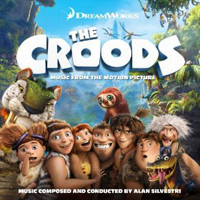- Composed by Alan Silvestri
- Relativity Music / 2013 / 70m
When I read that DreamWorks Animation was making a film about a family of dysfunctional Neanderthals, I assumed it was going to be the first animated movie about the Kardashians. But it isn’t. One of the film’s directors is Chris Sanders, who made Lilo & Stitch back in prehistoric times (2002), working with composer Alan Silvestri in the process, and Silvestri is back to rekindle the relationship on The Croods. The album opens with a song written by the composer with his usual lyricist Glenn Ballard (and the film’s two directors), “Shine Your Way”, performed by an ensemble called Owl City Featuring Yuna. I could be mistaken – indeed, I have been mistaken before, though certainly not since 2002 – but something tells me that when the list of great bands is compiled, The Beatles and U2 are unlikely to be troubled near the top of the chart by Owl City Featuring Yuna. However, I am not determined that at some point in my life, I too will feature Yuna. At the end of the album is a lovely feature, one I thought had pretty much died out – concert arrangements of the score’s two main themes. “Cave Painting Theme” is a lovely piece with an adventurous spirit; “The Croods Family Theme” is fairly similar, with a more sentimental feeling. Both themes are very pleasant and appear (usually fleetingly) through the body of the score, though they’re not as memorable as this composer’s themes usually are.
The score itself flits around all over the place. An early highlight is “Smash and Grab”, an entertaining piece of marching band music which features the melody from Fleetwood Mac’s “Tusk”. And you can say what you want about Fleetwood Mac, they’re certainly no Owl City Featuring Yuna. (Presumably the track “Bear Owl Escape” accompanies a scene where the owl escapes from Yuna itself.) Twinkly kiddie music alternates with slightly Zimmerish tribal percussion and some thunderous, trademark Silvestri action music. Each of the elements is done well and it’s all very technically accomplished – sadly the whole seems a lot less than the sum of its parts, with the Mickey Mousing getting pretty tiresome after a while (and the album lasts for a lot longer than a while) – in recent years Randy Newman displayed a mastery of this technique in his Pixar scores, but this is a long way short of that standard, at least in terms of an album listening experience. It’s the sort of album where if I walked into a room and heard a few seconds here and there (not a situation likely to occur very frequently) I’d probably think it sounded fantastic and want to listen to the whole thing. But when I do listen to the whole thing, it’s so endlessly manic I just can’t enjoy it. Paying for the two concert pieces individually would be a wise investment; I can’t honestly recommend the rest of it.
Rating: **
facebook.com/moviewave | twitter.com/MovieWaveDotNet | amazon.com












Really? I think this is Silvestris thematically strongest Score since Beowulf and the strongest overall since Van Helsing (although frankly not on the level of awesome of the latter). Silvestris’ last couple of Scores had the Tendency to sound stale, by comparsion this was a long overdue breath of fresh Air!
But to each his own, I guess.
I don’t actually think it sounds significantly fresher than Silvestri’s recent output, it just so happens to be in a different genre. While I agree with James that the mickey-mousing becomes a pretty big irritant in the first half of the album, I don’t think I’d rate the score quite as low. Other composers can pull off manic music like this with much more fluidity on album, though, especially someone like John Powell.
In any case, if I had to choose between The Croods or any of Silvestri’s recent, generic action scores from G.I. Joe onwards, I’d pick one of the action scores. They’re just more enjoyable overall.
I don’t think that any of his post-2009-Action-Scores were *bad*, mind you. Each of them had highlights, pushed the right buttons in the Action-Cues, most had a catchy Main Theme and all were intrumentally and stylistically more consistent than “The Croods”, which was IMO more consistent in another aspect, ironically: Themes. Both are frequently stated, and together with the Action- and Underscore-Cues they form a more than sufficient narrative. Plus, due to its attitude, I just had more *fun* listening to it.